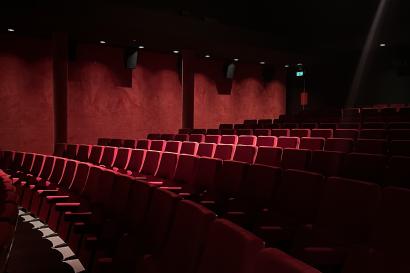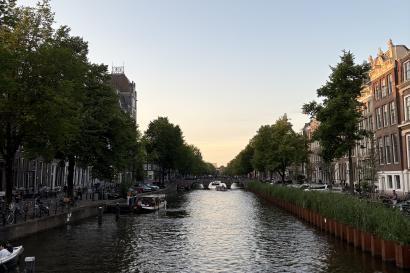It’s hard to believe that I’ve been in Amsterdam for almost seven weeks! At this point, I can walk around my neighborhood without a map, have a good grip on which local cafes are my favorites, and have fallen into some semblance of a day-to-day routine. Between visits to museums, meeting friends around the city, a roundtrip to the airport for a quick trip to London, and a weekend of volunteering across town, I’ve blown through almost enough transit fare to justify getting a monthly pass. I’ve even started saying denk je wel (thanks a lot) to tram attendants and grocery store cashiers, hoping to cover up my American status with the most basic of Dutch exchanges. And yet, I’ve barely picked up any more of my city’s native language.
Acquiring a New Language… or Not
When I spent 17 days volunteering in Ecuador a few years ago, I picked up a decent amount of basic Spanish: I could ask the lady at the panaderia how her morning was going, make sure my young students used soap during visits to the baño, tell the wonderful woman who made us lunch how delicious it was, and so on. Never having taken a Spanish class, I was very proud of my new linguistic skills by the time I departed the Quito airport, especially because the language is so far off from the Japanese I studied in high school (and later in college).
Amsterdam is different. Apart from the introductory Dutch language course I’m happily taking through IES Abroad, I don’t have a lot of direct contact with the local tongue. I do see it written almost everywhere—uitgang (exit), overdragen (transfer), boodschappen (groceries), kassa (checkout), fiets (bicycle), ijs (ice cream), lekker (tasty) — and am developing quite a repertoire of words I can read. My Dutch professor went over the language’s many vowel sounds with us, though my pronunciations immediately pegged me as a foreigner (and honestly, mostly still do), so anyone who hears me attempt Dutch responds to me in English. In places like restaurants, I automatically approach people in my own language, because most everyone in the city speaks it.
“Nobody Speaks Dutch Anymore”
Last weekend, I volunteered at Unseen magazine’s annual festival, which showcased photographers and mixed media artists from 35 countries in galleries, workshops, a huge book market, and stand-alone exhibits across the beautiful Westergasfabriek public park. I was raised by a photographer (hi, Mom!), so I enjoyed every minute of working, exploring the fair, accumulating free postcards, willing myself not to buy 50 books, and pouring over a free issue of the magazine the volunteer coordinator gave me. Most of the other volunteers that I met were like me in that they weren’t Dutch: many, like an art student from Glasgow, a hobbyist from Berlin, and a curator from Milan, flew to Amsterdam for the sole purpose of attending the festival, which staff could do for free all weekend. English was the language that united us, and Unseen being an international festival, the fair became a bubble of English-only text with a multitude of other languages represented through side conversations.
My second shift was at the information desk, positioned between a massive map of the park and the entrance to the fair. It was a picture-perfect sunny day, ideal for both festival-goers and locals walking their dogs along the canal at the park’s Southern border; needless to say, my fellow American colleague and I talked to a lot of people over our four hour shift. Our shirts said “Ask Me,” but being in the Netherlands, many people rightfully assumed they could vraag about everything from the location of the VIP desk to just what in the world all this fanfare was doing in their local patch of grass. Unless I could understand their questions - and I learned the words for ticket and VIP very quickly - I had to resort to my best retail worker smile and respond, “I’m sorry, do you speak English?”
Some code-switched at the tip of a hat, while others hesitantly chuckled and said, “sure;” most were absolutely fine with me forcing them out of their mother tongue in their own territory. A few people, including a very kind man who stood with us to wait for his son for almost half an hour, initiated conversations with us about what we were doing in Amsterdam and how it differed from our homes in America (after hearing our accents, nobody needed to ask if we were Americans). A few others, though, were a bit more hostile. One exasperated younger man told me, “Nobody speaks Dutch anymore!!” before huffing and calmly asking me where to buy a copy of the magazine (which, I didn’t have the heart to tell him, is published in English). A few other people raised their voices, one wagged her finger at us, and one was so perplexed by being greeted by Americans that a local standing nearby came over to defend us (in Dutch). Although the info desk was my favorite shift of the weekend and I loved talking to the majority of the people who approached me, those few negative interactions weighed on my mind. Yes, I was volunteering my time to be there and trying the best I could to help everyone, but those people still had every right to be frustrated. I don’t like seeing the local language being drowned out by English — and yet, I’m part of the problem.
Ik Spreek en Beetje Nederlands
I want to make an effort to learn the local language here not only because I study linguistics and find it interesting, but because I want to be as much of a part of the community as I can during my time here. But it’s difficult to pick up a language I’m not hearing. Some volunteers that I met at Unseen live in Amsterdam long-term, but even after years as Dutch residents speak minimal amounts of the language. It’s not that they’re not trying to pick it up — they just can’t find consistent means to do so. The English accessibility here is both a blessing and a curse: helpful to a fault, both minimally and massively polarizing.
During my exchange trip to Japan in 12th grade, any Japanese I spoke to a local (even just telling my host mother “Nice to meet you,”) was met with delight and praises of "jyōzu". I remember feeling very confused when nobody seemed to expect me to speak the country’s national language; after all, whenever my Spanish skills didn’t suffice in Ecuador, I would have to grab a Spanish-speaking friend in order to communicate with almost anyone. Granted, Amsterdam and Tokyo are much more foreign tourist-heavy than Riobamba, but the point stands: speaking any Dutch I can muster should be expected, not a courtesy.
After a friend of mine went to Utrecht, another city in the Netherlands, they told me about the prevalence of Dutch over English outside of our tourist-heavy area. It was comforting to them, and for me to hear, even though neither of us can hold a conversation longer than four sentences in Dutch.
I almost stumbled upon picking up my limited Spanish: in Riobamba, there wasn’t a way around it. Although I’m discovering that that just isn’t going to happen here, I’m not going to give up. I’m starting to make more of a conscious effort to speak, not just read, Dutch: I’ve embarrassed myself a few times, but that’ll pass. I told my dad when I got here that the linguistic landscape I was observing in this city was fascinating. I can’t wait for that interest to keep growing as I’m able to expand my vocabulary, and with it, my cultural knowledge in the country I’m now calling home.
If you’re studying abroad and are struggling to feel more like a local than a tourist, here are some things that have helped me feel like a part of the community:
- Volunteering(!). Especially in Amsterdam, there are a ton of different opportunities to get out there. You’ll get to know the area, local people, and maybe even connect with other international students. Working at Unseen was one of the most positive, energizing experiences I’ve had here so far.
- Scoping out the local coffee spots. In Amsterdam and (I’m told) a lot of the rest of Europe, coffee is more of a social activity than a grab-and-go ritual. Cups of coffee are much smaller than I, a Starbucks Gold member, am used to, but strong—they’re meant to be sipped throughout a meeting with a friend. I’m also running into a few cafes with designated no-wifi times to promote human-to-human (instead of human-to-laptop) connections. So, grab a friend, a book, or your homework, and find a cafe to sit in: you’ll hear a lot of the local language bouncing off the walls, and gather some knowledge about your specific neighborhood, too.
- Taking walks, bike rides, and public transit — not Ubers. In Amsterdam, it’s most common to bike, but the public transit makes the whole city accessible to everyone in any weather. I’ve learned of a ton of stores and cafes to try by looking out the window of my tram, or by walking to the nearest metro stop after a long one-way walk I’m too tired to make a round trip. Plus, any announcements on trains (from stops and transfers to shutdowns) will be made in the local language first, and even just reading the advertisements is a good way to reinforce it.
- Finding (free) local events to check out. In Amsterdam, there’s always some kind of market happening somewhere. Whether you’re looking for produce, meals (or if you’re in Amsterdam, a cone of french fries), secondhand clothing, art, or just a place to people-watch, if you hear of a market, there’s no harm in checking it out. I subscribe to a weekend newsletter from a travel blogger who lives in Amsterdam, which has been really helpful if I’m looking for something to try on a Saturday morning. It seems tourist-y, but it actually has helped me become more acquainted with my city on a local level.
If you’re interested in what an international photography festival looks like, here are some scenes from Unseen Amsterdam.

Betsy Barthelemy
<p>I was very fortunate to have the opportunity to briefly study abroad in Japan (several cities) and do community service work in Riobamba, Ecuador, while in high school, effectively biting me with the travel bug. At school, I major in English and minor in anthropology, but also enjoy taking classes in linguistics, photography, Japanese, and theater. When I’m not in class, I’m probably in a chorale rehearsal, helping edit Macalester’s newspaper, working at the cafe across the street, or baking cookies.</p>









